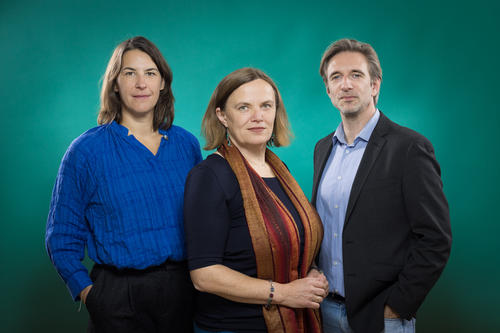Math+
How Berlin mathematics is shaping the future
The Berlin Mathematics Research Center MATH+ is a cross-institutional and interdisciplinary Cluster of Excellence, where researchers explore and advance new approaches in applied mathematics. The focus lies on developing mathematical foundations to harness the growing volumes of data in fields such as the life and materials sciences, energy and network research, and the humanities and social sciences. The goal is to drive not only scientific progress but also technological innovation and a deeper understanding of social processes.
MATH+ aims to have a lasting impact on the development of mathematics.
MATH+ brings together the three major Berlin universities — Freie Universität Berlin (FU), Humboldt-Universität zu Berlin (HU), and Technische Universität Berlin (TU) — along with the Weierstrass Institute for Applied Analysis and Stochastics (WIAS) and the Zuse Institute Berlin (ZIB). The Cluster of Excellence continues the success stories of the renowned MATHEON research center and the internationally acclaimed Berlin Mathematical School (BMS), which now serves as the graduate school of MATH+.
Priorities for the new funding phase
Claudia Schillings (Freie Universität Berlin) Andrea Walther (Humboldt-Universität zu Berlin), Sebastian Pokutta (Technische Universität Berlin)
Image Credit: Kay Herschelmann / MATH+
“In our second funding phase, one of our key goals is to intensify research on the social dynamics of opinion formation,” says Sebastian Pokutta, Head of the Chair of Mathematical Optimization at Technische Universität Berlin, Vice President of the Zuse Institute Berlin, and one of the three spokespersons for MATH+. “The speed at which opinions spread and shift through social media has increased dramatically in recent years. That’s why it is more important than ever to understand how opinion formation works—so we can strengthen democratic values and processes and protect them from threats. Methods from artificial intelligence and optimization play a crucial role in this—they are central components of MATH+.”
“Another major focus of our next funding phase will be sustainability,” adds MATH+ spokesperson Andrea Walther, who leads the Mathematical Optimization group at Humboldt-Universität zu Berlin. “This involves, on the one hand, algorithms that can increase efficiency in sectors like mobility or energy—such as optimizing transportation networks. On the other hand, it’s also about improving the efficiency of our mathematical methods themselves. With optimized algorithms, for example, we will be able to significantly reduce the high energy consumption currently required for training artificial intelligence.”
Claudia Schillings, Head of the Numerical Analysis group at Freie Universität Berlin and the third MATH+ spokesperson, summarizes: “Going forward, we will continue to expand our focus on applied mathematics based on data-driven modeling, simulation, and optimization. In addition to mobility and energy, this will increasingly include health and technology. We also aim to intensify our collaboration with industry—bringing added value to Berlin and the region.”
Spokespersons: Prof. Dr. Sebastian Pokutta (Technische Universität Berlin und Zuse-Institut Berlin); Prof. Dr. Andrea Walther (Humboldt-Universität zu Berlin); Claudia Schillings (Freie Universität Berlin) Applicant universities: Freie Universität Berlin, Humboldt-Universität zu Berlin, Technische Universität Berlin (coordinating university) Participating institutions: Weierstrass Institute for Applied Analysis and Stochastics (WIAS), Zuse Institute Berlin (ZIB) Cooperation partners:- The Berlin-Brandenburg Academy of Sciences and Humanities (BBAW)
- Berlin Social Science Center (WZB)
- Ferdinand-Braun-Institut, Leibniz-Institut für Höchstfrequenztechnik (FBH)
- German Archaeological Institute (DAI)
- Helmholtz Zentrum Berlin für Materialien und Energie (HZB)
- Max Delbrück Center for Molecular Medicine (MDC)
- Max Planck Institute for Molecular Genetics (MPIMG)
- Potsdam Institute for Climate Impact Research (PIK)
- Physikalisch-Technische Bundesanstalt (PTB)


